人教版九年级英语12单元教案说课材料
- 格式:doc
- 大小:66.50 KB
- 文档页数:8
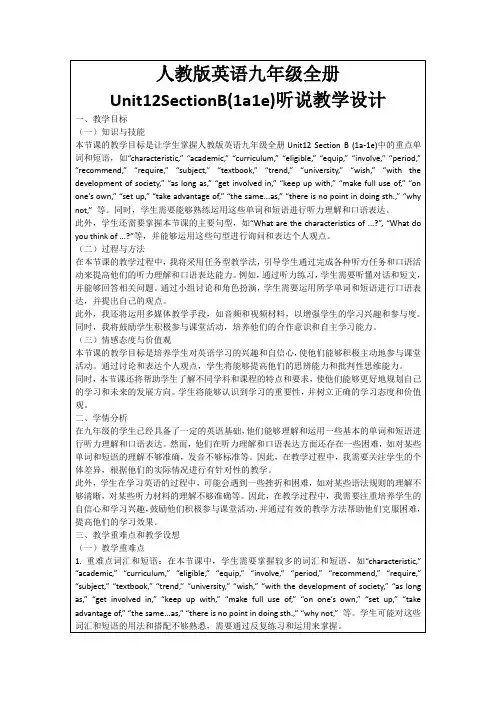
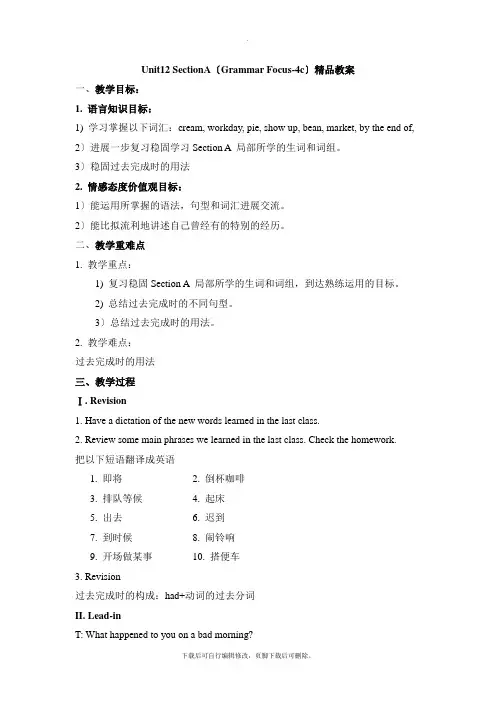
Unit12 SectionA〔Grammar Focus-4c〕精品教案一、教学目标:1. 语言知识目标:1) 学习掌握以下词汇:cream, workday, pie, show up, bean, market, by the end of, 2〕进展一步复习稳固学习Section A 局部所学的生词和词组。
3〕稳固过去完成时的用法2. 情感态度价值观目标:1〕能运用所掌握的语法,句型和词汇进展交流。
2〕能比拟流利地讲述自己曾经有的特别的经历。
二、教学重难点1. 教学重点:1) 复习稳固Section A 局部所学的生词和词组,到达熟练运用的目标。
2) 总结过去完成时的不同句型。
3〕总结过去完成时的用法。
2. 教学难点:过去完成时的用法三、教学过程Ⅰ. Revision1. Have a dictation of the new words learned in the last class.2. Review some main phrases we learned in the last class. Check the homework.把以下短语翻译成英语1. 即将2. 倒杯咖啡3. 排队等候4. 起床5. 出去6. 迟到7. 到时候8. 闹铃响9. 开场做某事10. 搭便车3. Revision过去完成时的构成:had+动词的过去分词II. Lead-inT: What happened to you on a bad morning?Ss…引导学生用过去完成时答复。
III. Grammar Focus.1. 过去完成时讲解。
2. 学生阅读Grammar Focus中的句子,然后做填空练习。
1〕当我到达学校的时候,我才意识到我把书包忘在家里了。
When I got to school, I realized I ______ ______ my backpack at home.2〕到我返回学校的时候,铃声已经响过了。
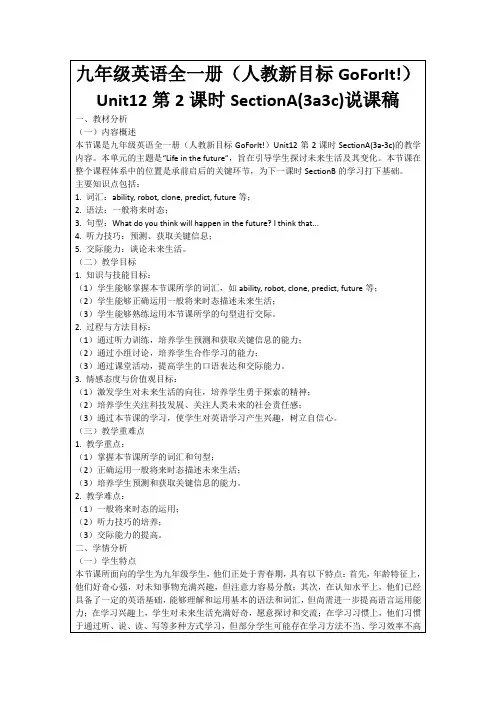
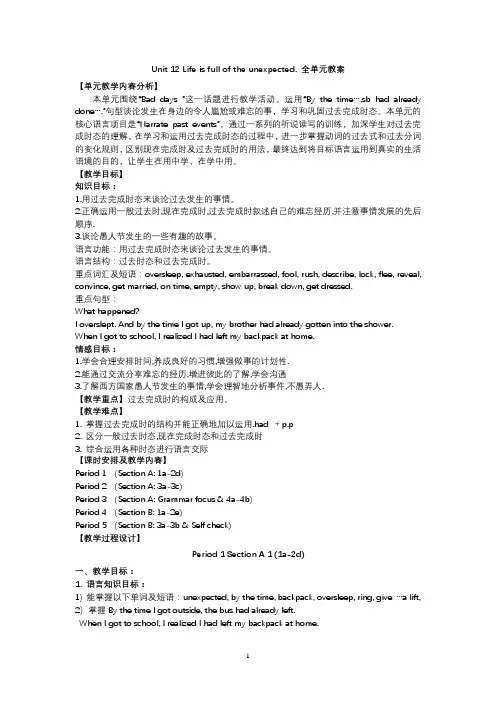
Unit 12 Life is full of the unexpected. 全单元教案【单元教学内容分析】本单元围绕“Bad days ”这一话题进行教学活动。
运用“By the time…,sb had already done….”句型谈论发生在身边的令人尴尬或难忘的事,学习和巩固过去完成时态。
本单元的核心语言项目是“Narrate past events”,通过一系列的听说读写的训练,加深学生对过去完成时态的理解,在学习和运用过去完成时态的过程中,进一步掌握动词的过去式和过去分词的变化规则,区别现在完成时及过去完成时的用法,最终达到将目标语言运用到真实的生活语境的目的,让学生在用中学,在学中用。
【教学目标】知识目标:1.用过去完成时态来谈论过去发生的事情。
2.正确运用一般过去时,现在完成时,过去完成时叙述自己的难忘经历,并注意事情发展的先后顺序.3.谈论愚人节发生的一些有趣的故事。
语言功能:用过去完成时态来谈论过去发生的事情。
语言结构:过去时态和过去完成时。
重点词汇及短语:oversleep, exhausted, embarrassed, fool, rush, describe, lock, flee, reveal, convince, get married, on time, empty, show up, break down, get dressed.重点句型:What happened?I overslept. And by the time I got up, my brother had already gotten into the shower.When I got to school, I realized I had left my backpack at home.情感目标:1.学会合理安排时间,养成良好的习惯,增强做事的计划性.2.能通过交流分享难忘的经历,增进彼此的了解,学会沟通3.了解西方国家愚人节发生的事情,学会理智地分析事件,不愚弄人.【教学重点】过去完成时的构成及应用。
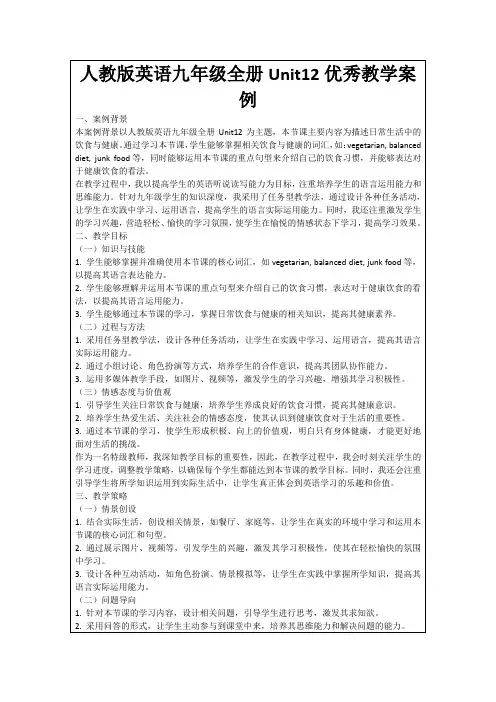
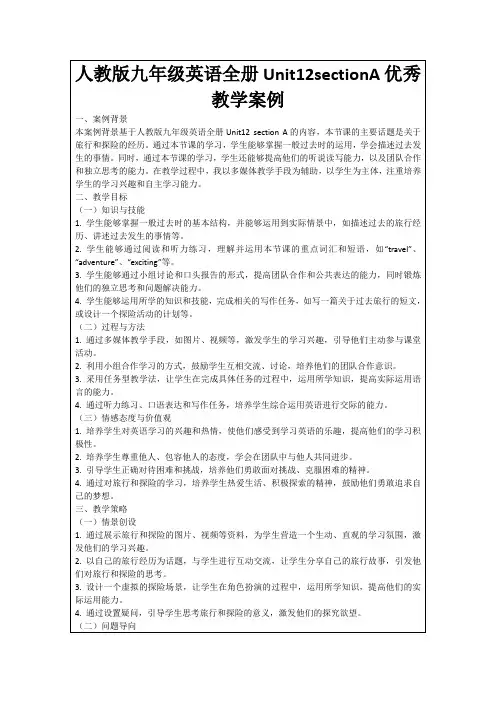
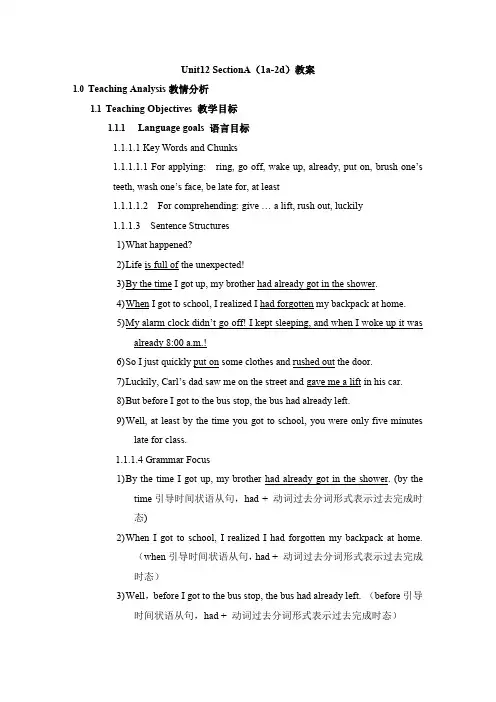
Unit12 SectionA(1a-2d)教案1.0Teaching Analysis教情分析1.1Teaching Objectives 教学目标1.1.1Language goals 语言目标1.1.1.1 Key Words and Chunks1.1.1.1.1 For applying: ring, go off, wake up, already, put on, brush one’steeth, wash one’s face, be late for, at least1.1.1.1.2 For comprehending: give … a lift, rush out, luckily1.1.1.3 Sentence Structures1)W hat happened?2)L ife is full of the unexpected!3)B y the time I got up, my brother had already got in the shower.4)W hen I got to school, I realized I had forgotten my backpack at home.5)M y alarm clock didn’t go off! I kept sleeping, and when I woke up it wasalready 8:00 a.m.!6)S o I just quickly put on some clothes and rushed out the door.7)L uckily, Carl’s dad saw me on the street and gave me a lift in his car.8)B ut before I got to the bus stop, the bus had already left.9)W ell, at least by the time you got to school, you were only five minuteslate for class.1.1.1.4 Grammar Focus1)B y the time I got up, my brother had already got in the shower. (by thetime引导时间状语从句,had + 动词过去分词形式表示过去完成时态)2)W hen I got to school, I realized I had forgotten my backpack at home.(when引导时间状语从句,had + 动词过去分词形式表示过去完成时态)3)W ell,before I got to the bus stop, the bus had already left. (before引导时间状语从句,had + 动词过去分词形式表示过去完成时态)1.1.2Ability goals 能力目标1.1.2.1 学会用when/ by the time引导时间状语从句,用“had+动词过去分词形式”谈论过去的事情。
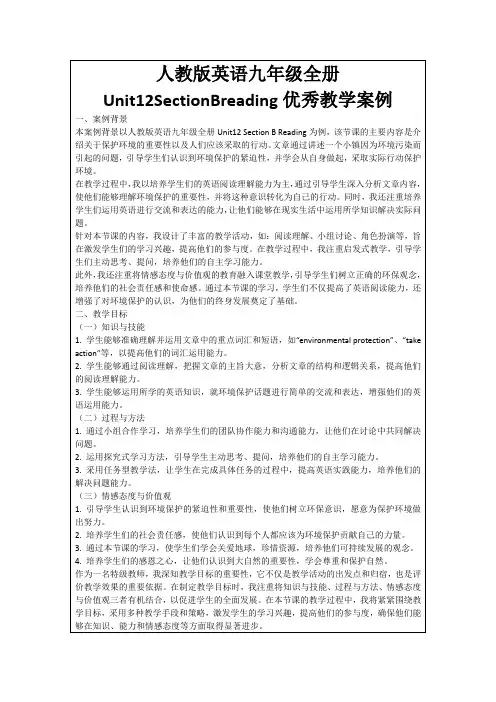
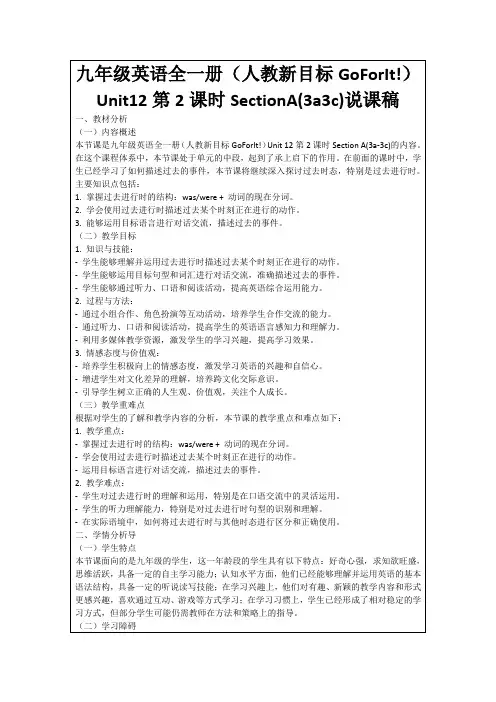
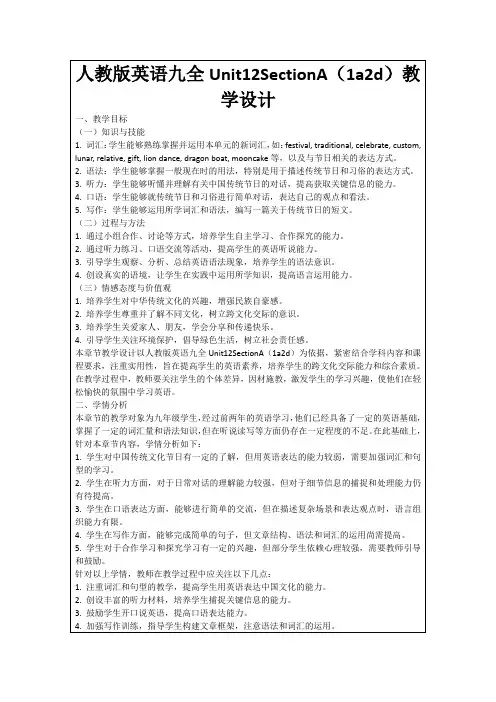
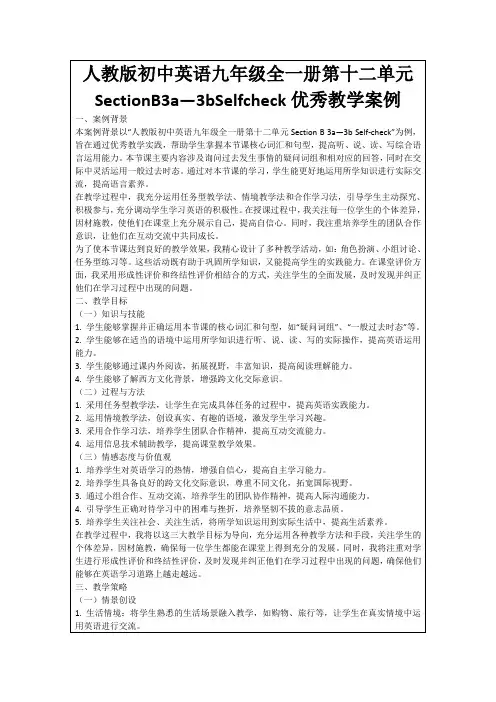
海港区中小学中青年教师教学技能大赛初赛参赛材料中学英语组人教版九年级英语Unit12 Life is full of the unexpected.Section A 3a-3c 阅读课教学设计一、教材内容分析:本单元以“难以预料的事情(Unexpected events)”为话题,属于新课标中“人与自我”范畴内的“生活与学习”主题群中的“身心健康,抗挫能力,珍爱生命”的子主题,通过学习帮助学生认识到生活中常常有难以预料的事情发生,形成坦然面对生活中挫折和意外的乐观心态。
本节课是本单元的第二课时,在第一课时口头谈论生活中意外事件的基础上,进一步进行阅读学习,提高阅读理解能力,最后在阅读输入之后,学生逐渐学会如何向他人讲述一件难以预料的事情并且形成积极乐观的心态。
二、学情分析本课话题谈论人们生活中出乎预料的事件或者突发状况,能激起学生的好奇心,调动学生学习英语的积极性,为本课时的学习做好了情感上的准备。
同时,在八年级下册unit5 What were you doing when the rainstorm came?学生也谈论过突发状况发生时人们的活动,所以话题对他们来说并不陌生,不同的是八下第五单元主要用到过去进行时谈论事件,本单元使用过去完成时,学生可以对有以往的学习经验进行迁移,这样也为本节课的学习做好了语言知识和能力方面的准本。
三、教学目标1.理解文章中的重点词汇和句子,把握文章的整体结构。
2.能够通过阅读描述“过去的过去”的活动,对过去完成时和时间状语从句进行归纳总结和拓展应用。
3.通过寻读,能够理解细节并理清事件的发展顺序。
4.通过感受主人公处境,培养学生乐观的心态,能暗示自己:糟糕的事情总会过去。
四、教学重点和难点重点:理解文章中的重点词汇和句子,把握文章的整体结构。
1.重点:(1)通过寻读,能够理解细节并理清事件的发展顺序。
(2)通过完成阅读任务,掌握文章大意,理解有关突发事件转危为安的故事内容。
Unit12 life is full of unexpected(sectionA 1a-2d) 教学准备一.教学目标1.能正确使用有when,before,as,by the time引导的时间状语从句表达过去发生的事情。
2.了解过去完成时3.能讲述过去发生的事情。
二.教学重点/难点1.when,before,as,by the time引导的时间状语从句表达过去发生的事情2.过去完成时(had +动词的过去分词)三.教学过程Step 1 Lead inT: What do you usually do in the morning before school?S1: (get up, brush my teeth, take a shower, …)T: Do you like mornings? Why or why not?S2: Yes/No…Because…T: Have you ever been late for school? Why or why not?S3: Yes/No…Because…[设计意图:创造真实的语言环境,师生互动交流,谈论自己早晨做的事情,由此导入新课。
]Step 2 Practice (1a)T: Look at Picture 1 on Page 89. What did the girl do?S1: She overslept and got up late.T: What did she do next?…Get the students to talk about Mary's morning in groups and then report to the whole class.[答案] 1.She woke up late.2.She wanted to use the bathroom but someone was in the bathroom.3.She ran to catch the bus.4.The bus had already left.5.She got to school and realized she had left her backpack at home.[设计意图:呈现不同的图片,通过小组讨论有关Mary的清晨活动内容,锻炼口语表达能力。
精品文档Unit12 You are supposed to shake hands.重点短语词组应该做某事be to do sth 握手访问by 毕竟本应该做但没做have done 餐桌礼仪table到达at/in 有点晚late习惯于某事be/get to sth 习惯于做某事be/get sth 被用于做某事be sth 被用作.... Be过去常常做某事sth 特地,不怕麻烦的做某事使某人感到宾至如归计划做某事sth没有理由have 注意你的行为your manners发出噪音make (a) 做鬼脸make自学....by oneself 在适当的时间at the time 以......开始begin 忍不住做某事can't sth代替of 对某事随意be sth邀请某人做某事sb sth 指向重点短语句型讲解:1. Y ou should have asked what you were supposed to wear.你本应该问清楚怎么样穿才得体。
中的“should have asked”是“情态动词+现在完成时”表示过去本应该做某事,事实上没有做,这是虚拟语气的一种表达方式。
如:She should have gone to Beijing. 她本应该去了北京。
(没有去)同时was/were supposed to do sth 表示过去本该做某事而实际上并没有做,就相当于should have done sth.2. make (some) mistakes 犯了(一些)错误。
make a mistake 犯错误(一个)与mistake相关的短语by mistake 错误地mistake…for…把..误认为…5.relaxed:用来形容人,表示人本身很放松,主语一般是人。
relaxing:指物,表示事物可使人很放松。
I feel really after the vacation.经过这次令人放松的假期后我感到很放松。
3. …it’s okay if you arrive a bit late….即使你晚到一会也没关系。
a little 与a bit 二者都是“有点儿”的意思。
(1)二者相同之处在于①都可做状语,修饰比较级He is a bit/ a little older than you.②都可做主语或宾语。
Please give me a bit/ a little.(2)不同之处在于:两者修饰名词时,a little可以直接加名词,a bit必须加of后才能接名词。
A little money = a bit of money4. drop by 顺便拜访串门We just dropped by our friends’homes.我们刚刚去朋友家串门。
drop in/on sb 顺便走访某人。
Would you drop in/on us this evening for a chat?你今晚过来和我们聊聊好吗?5. invite sb. to do sth. 邀请某人做某事如:Lily invited me to have dinner.莉莉请我吃晚饭。
6. without .prep.没有. 其后常接名词、代词和动词ing形式。
Jim今天早上没吃早饭就去学校了。
7. around the world == all over the world 全世界8.at the table 在饭桌旁at table 在吃饭类似的短语还有:in hospital by sea 由海路in future从今以后in the hospital by the sea在海岸上in the future在将来9.pick up sth 捡起挑选如:He picked up his hat. 他捡起他的帽子。
如果宾语是代词需置于pick与up之间pick it up10. start doing == start to do 开始做某事如He started reading.== He started to read. 他开始读。
11. point at 指着at是介词,后跟动作的目标。
女孩正指着墙上的地图。
point to 指向to是介词,后跟动作的方向。
当point做及物动词讲时,常用于point sth at sth 用…指着You shouldn’t point your finger at anyone.你不应该用手指任何人。
12. stick v. 剌截stick…into….把…插入…别把叉子插入食物中。
n. 棒,棍请递给我那根棍子。
chopsticks 筷子是由chop(砍)+stick(棒)合成,通常用复数形式:chopsticks13. be different from 与…不同Chinese food is different from theirs. 中国菜与他们的不同.be different in…在…方面不同这两件毛衣在颜色上不一样。
14.I find it difficult to remember everything. 我发现要记住每一样事是困难的。
形式宾语真正宾语常见的形式宾语有:find / think + it/them +形容词to do sth. 如:I think it hard to study English.15.Everying was unfamiliar.一切都是那样的陌生。
Be familiar/unfamiliar to sb 为某人所熟悉/不熟悉That face is unfamiliar to me.Be familiar/unfamiliar with sth 对某物熟悉/生疏I’m unfamiliar with that face.16. And I had not just one set to use, but two or three of each.Not…but…不是…而是…,用来连接连个并列成分。
他们不是需要钱,而是需要时间。
Not…but…连接两个主语时,谓语动词遵循就近原则。
不是黎明而是黎明的父母去了长城。
17. Was I supposed to begin with the largest ones or the smallest?Begin with 以…开始第二课以一首歌开始。
n, beginning from the beginning 自始,从一开始at the beginning of …在…的开始(初)from beginning to end 至始至终at the beginning of December at the beginning of Winter18.E-mail English is a new kind of written English that is being used to save time.电子邮件英语是一种新型的用来节省时间的书面英语。
(1)that is being used…是一个定语从句,修饰前面的written English. 定语从句用的是现在进行时的被动语态,that在定语从句中做主语,不能省略。
(2)written English 书面英语spoken English 英语口语written 与spoken 是过去分词形式,均表被动关系,充当形容词,做前置定语。
(3)在英语中表示“被动关系”的有两种形式,一种是过去分词做定语,一种是被动语态。
The novels written by Lu Xun are very educational.鲁迅写的小说很具有教育意义。
The novels are written by Lu Xun.这些小说史鲁迅写的。
英语中表示“正在进行”的有两种形式,一种是现在分词做定语/宾补,一种是进行时态。
I found a wallet lying on the ground. (做宾补)The girl singing the song is my younger sister. (做定语)19.This is because they come from a computer program called ICQ, which means I seek you.20. can’t stop doing 忍不住做某事=can’t help doing sth.I can’t stop laughing. 我忍不住笑.当听到这个消息,我忍不住哭了。
21…..it’s created by combining letters and symbols or numbers to sound like other words….(1)be created by 由……组成,by是介词,后接名词、代词或动名词作宾语。
(2) combine .v. (使) 结合,混合combine…and…将…和…混合起来combine…with…将…与…合并Combine “tele”with “communication”, we’ll get a new word “telecom”.22.Do these two on your own…独自做这两道题….On one’s own 独自的,主动的,自愿的。
在句中做状语。
他现在自食其力。
Of one’s own 属于某人自己的,of前常接名词或不定代词。
We have no house of our own.With one’s own 用某人自己的,own后接名词。
Remember to do everything with your own ideas. 记着用你自己的想法去做事情。
23. cut up 切开切碎如:Let’s cut up the water melon. 让我们切开这个西瓜吧。
make faces做鬼脸face to face 面对面练习题Section A一、选词填空(用wear , put on, dress的适当形式填空)1. It’s very cold outside, ________ your coat.2. The girl who ________ in light blue is my sister.3. Many girls ________ shirts in summer time.4. Sally’s sister is old enough to ________ herself.5. “Could you ________ the children for me ?” she asked her husband.6. She ________ a new sweater today.7. Lily ________a flower in her hair yesterday.8. He ________ his glass to read the letter.二、单项选择( )1. They _____ a football match if it _____ fine next Thursday afternoon.A. will have; will beB. have; will beC. will have; is( )2.----Shall I ask Lillian to see the film with us?---- I don’t think she will. She _____ it twice. A. saw B. has seen C. sees( )3.Qingdao is one of the best places for _____ in China. A. surfing B.surf C. surfs( )4. We _____ shake hands when we meet someone for the first time.A. supposeB. suppose ofC. are supposed to( )5. Li Ying told me _____ for her at home. A. waits B. wait C. to wait( )6. I _____ my homework already. A. finish B. have finished C. finished( )7. ---- If you _____ a new idea, please call me as soon as possible.---- Sure, I will. A. keep up with B. catch up with C. come up with ( )8.Most of the girls in our class enjoy _____ music.A. listening B. listen to C. listening to( )9. Ted ten dollars on the shirt yesterday. A. cost B. spent C. paid( )10. I want to know whether . A. will he give back the bookB. he gives back the bookC. he will give back the book( )11.They some plans for the coming summer vacation.A. have madeB. has madeC. makes( )12. Lily planed her uncle the next day. A. to visit B. visiting C. visit( )13. Do you know Mr Green come to China? A. when B. what C.where( )14. --- Would you like something to drink? ---- .A. No, thanks.B. Yes.C. Not at all.( )15. Do you know a sports meeting next Friday?A. what there will to beB. if there is going to beC. there was going to have( )16. Who can help me do the work? A. other B. else C. another( )17. ---- May I speak to Li Hua, please?----I’m afraid he isn’t in. Would y ou like to a message? A. take B. write C. leave ( )18. ---- Do you want a pear of an orange? --- . I really don’t mind.A. NeitherB. EitherC. Both( )19. ---Excuse me, I want to know . ---I parked it behind this building.A. where did you park my carB. where you parked my carC. how you parked my car( )20. I can’t say I want to visit my grandpa. It’s a long time since we met last time.A. how oftenB. how longC. how soon D how much( )21. Thanks for me with my English. A. help B. helping C. helped( )22. He the phone and began to dial the number.A. pick upB. picks upC. picked up( )23. The hand of the clock is pointing eleven o’cl ock. A. to B. at C.out( )24. I’m really thirsty. I’ll stop.A. to take a drink B. taking a drink C. take a drink ( )25. Don’t. Your father is sleeping. A. turn off the TV B. make any noise C. be quiet ( )26. Nothing can make him his goals. A. to give up B. give in C. give up( )27. ---- were you away from home last year?---- About one month. A. How often B. How far C. How long( )28. He didn’t understand yesterday.A. what the teacher says.B. what the teacher saidC. what did the teacher say ( )29. Could you tell me ? A. how long the Fujiang River was B. how long was the Fujiang River C. how long the Fujiang River isD. how long is the Fujiang River ( )30. Traveling by train is cheaper and enjoyable than by air.A. more; much moreB. quite; much tooC. very; very muchD. much; far more( )31. It’s rude you to speak loudly in public. A. of B. for C. to( )32. The room was of smoke. A. full B. fill C. filled( )33. good information he has got! A. What a B. What C. How a( )34. clever boy he is ! A. What B. What a C. How a ( )35. Could you please help me cut these potatoes? A. up B. off C. down( )36. A good idea occur him. A. to B. at C. for( )37. It was eleven o’clock when he arrived Paris. A. in B. at C. to( )38. My grandpa is used to a walk in the morning. A. have B. has C. having ( )39. Great changes in my hometown.A. have been taken placeB. have taken placeC. has taken place( )40. --- Bob is late for school. ----Neither am I .A. always B. never C. ever. ( )41. The problem is we should do at first. A. that B. what C. which( )42. Mr Gereen has got used to with chopsticks. A. eat B. ate C. eating( )43. The girl is making plans her little brother with his lessons.A. helpsB. to helpC. helping( )44. What you to do before going to bed?A. did; supposeB. are ; supposingC. are ; supposed( )45. Without a word, he left home. A. says B. say C. saying( )46. The street is people on Sunday. A. crowded with B. crowd with C. crowd ( )47. Bob, there is a book on the floor, please .A. pick it up B. pick up it C. picks it up ( )48. Xiao Lin is a good students, he behaves .A. well B. good C. badly( )49. The town we visited a few years ago is much larger than before.A. itB. whoC. which( )50. --- You will go swimming this Saturday, won’t you?--- . I have to work this Saturday. A. Yes, I will B. Yes, I won’t C. No, I won’t三、完成句子1. There’s only (一点儿,少许)milk left, could you get some on your way home?2. Do you (握手)with each other when you meet someone for the first time?3. I (拜访)the writer on my way home yesterday.4. Though he (犯了一些错误), he is still a good boy.5. He said, “Miss Li, I’m sorry for (迟到).”6. I had a stomachache because of (错吃了食物).7.You (本应该完成家庭作业) yesterday but you didn’t’8. They (计划)take a vacation next week.9. The students are (制订计划) for the new term.10. ---- How’s everything? ---- .(还不错)11. He smiled, (毕竟) he succeeded at last.12. I don’t think English is (难得多) than Chinese.13. They (特地)to see me every month.14. You (本应该到达)here at 8 o’clock, but you’re late.15. The little girl (擦去)off the tears and laughed.16. 除最后一个问题没答外,其余问题他都答了。